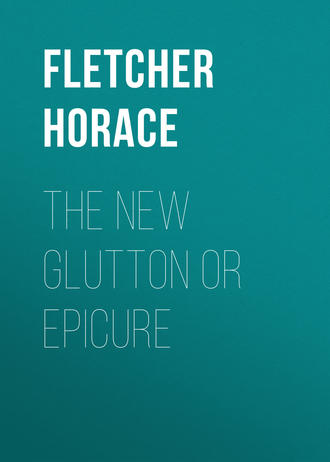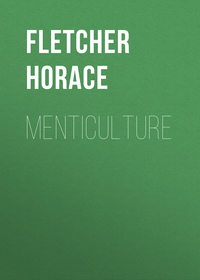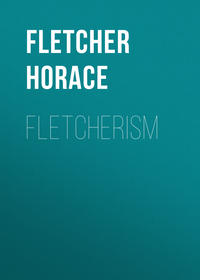 полная версия
полная версияThe New Glutton or Epicure
Among the Zuni Indians, observed by even recent travellers, it is the custom of the young girls of the pueblos to masticate wheat up to a given point of sweetness of taste and then to withdraw it from the mouth and collect it in a wooden dish until a sufficient quantity is secured, when the jaw-ground and saliva-sweetened "mess" is baked in the sun or by fire and becomes the "sweet cake" of the family. The change of the starch of the wheat or corn into sugary dextrose by the action of saliva, which is necessary to be done somewhere in the alimentary canal before it is assimilable nutriment, gives the sweet-cake quality to the food which is the dietary delicacy of these primitive people. By proper insalivation we perform the delectable service for ourselves instead of having it done for us by good young teeth aided by healthy saliva furnished by beautiful feminine assistance.
"FLETCHERISING" FOOD
WHAT IT REALLY MEANSThe term "Fletcherising," or "Fletcherizing," as applied to food has come into use without the suggestion of the nominee to a new filtering fame, and promises to spread; hence it is well to explain just what the term means.
Under the so-called "Fletcherizing" process, the mouth becomes a filter with most facile appliances for protecting the delicate alimentary canal from straining and poisoning. Instead of the "Pasteur Filter" for the purification of water and the "pasteurisation" of foods by sterilisation, the "Fletcher Filter" both separates and prepares whatever is given it to treat more perfectly than any mechanical or chemical device can do.
Dr. Kellogg appears in evidence often in this volume, and also with much appreciated strength of indorsement in the "A. B. – Z. of Our Own Nutrition"; but it is because he knows the value of the discovery of the natural food filter, has enormous chance to test it practically, and generously assists the reform with the might of his conviction. Hence the author has still another letter of his in hand from which to quote.
"Battle Creek, Mich., Oct 26, 1903."Mr. Horace Fletcher, New York.
"Dear Friend: – I have yours of October 4th. I should have answered it before, but have been away from home.
"I appreciate very much your offer to send me a memorandum of the work done in Cambridge, also a plan of the work at Yale. You have had a most interesting experience with eminent physiologists, and it has led you deep into the question of nutrition. I shall appreciate very much suggestions from you with reference to subjects for experimental work, and other suggestions which may occur to you respecting the methods, etc. I am sure your wide experience will be a great help to us. The more I test your ideas the more confidence I have in them.
"What you say about the wonderful effect of mastication is certainly correct. I observed it right away as soon as I began to practise Fletcherizing. By the way, I wrote an article for the last number of my journal, GOOD HEALTH, about "Fletcherizing" food, and I see our colleagues are already taking it up. One of my most able associates, Dr. J. A. Read, who has charge of our sanitarium in Philadelphia, gave a lecture last Thursday night to his patients on "Fletcherizing" food, and his audience was greatly interested. I am sure you deserve to have your name immortalised, as Pasteur's has been. I mention "Fletcherizing" in almost every lecture I give to our patients. I think most of our patients are "Fletcherizing" and are getting great good from it, also a large proportion of our six hundred nurses and other employees.
"Awaiting a letter of suggestions at your convenience, I remain,
"As ever your friend,"(Signed) J. H. Kellogg.""Fletcherizing" does not consist only and merely of careful chewing. Careful chewing, with cheerful attention, will secure the comminution, insalivation, and all necessary chemical preparation for perfect digestion, and will separate hard and indigestible matter from the food mass put into the mouth for treatment; but it is the whole environment of the act which counts the best results.
Cheerfulness is as important as chewing; and if persons cannot be cheerful during a meal they had better not eat. Not eating will not hurt them in the least, but lack of cheerfulness will defeat the object of the meal by causing more or less indigestion; and hence it not only does no good to eat when not cheerful, but actually does harm. Haste and lack of cheerfulness are about the same in effect on digestion. You have no idea how much real nutriment you can get into your system in five minutes if you are industrious with your munching and are cheerful about it; so don't hurry when you have full ten minutes, or perhaps twenty minutes, for taking nourishment.
You cannot go faster than Nature will let you, and it is profitable to study Nature and watch her constantly for her proper cue. Don't try to get ahead of her or you may sink in mud or into deep water.
Hence the author begs of those who heed his suggestions, especially if they give them his name, to respect them in all their essentials. Don't chew anything when you are mad or when you are sad, but only when you are glad that you are alive and glad that you have the appetite of a live person and one that is well earned.
That is as much a part of the "Fletcherizing" process as munching, and one should never forget it.
So, please, when you "Fletcherize," if you "Fletcherize" at all, do it well and completely and do not half do it and then condemn the method. The method is all right, notwithstanding the name which has been attached to it, for it is simply Nature's method.
Explanation of The A. B. C. Life Series
THE ESSENTIALS AND SEQUENCE IN LIFEIt would seem a considerable departure from the study of menticulture as advised in the author's book, "Menticulture," to jump at once to an investigation of the physiology and psychology of nutrition of the body and then over to the department of infant and child care and education as pursued in the crêche and in the kindergarten; but as a matter of fact, if study of the causation of human disabilities and misfortunes is attempted at all, the quest leads naturally into all the departments of human interest, and first into these primary departments.
The object of this statement is to link up the different publications of the writer into a chain of consistent suggestions intended to make life a more simple and agreeable problem than many of us too indifferent or otherwise inefficient and bad fellow-citizens make of it.
It is not an altogether unselfish effort on the part of the author of the A. B. C. Life Series to publish his findings. In the consideration of his own mental and physical happiness it is impossible to leave out environment, and all the units of humanity who inhabit the world are part of his and of each other's environment.
It would be rank presumption for any person, even though gifted with the means to circulate his suggestions as widely as possible, and armed with the power to compel the reading of his publications, to think that any suggestions of his could influence any considerable number of his fellow-citizens of the world, or even of his own immediate neighbourhood, to accept or follow his advice relative to the management of their lives and of their communal and national affairs; but while the general and complete good of humanity should be aimed at in all publications, one's immediate neighbours and friends come first, and the wave of influence spreads according to the effectiveness of the ideas suggested in doing good; that is, in altering the point of view and conduct of people so as to make them a better sympathetic environment.
For instance, the children of your neighbours are likely to be the playmates of your own children, and the children of degenerate parents in the slum district of your city will possibly be the fellow-citizen partners of your own family. Again, when it is known that right or wrong nutrition of the body is the most important agent in forming character, in establishing predisposition to temperance or intemperance of living, including the desire for intoxicating stimulants, it is revealed to one that right nutrition of the community as a whole is an important factor in his own environment, as is self-care in the case of his own nourishment.
The moment a student of every-day philosophy starts the study of problems from the A. B. C. beginning of things, and to shape his study according to an A. B. C. sequence, each cause of inharmony is at once traced back to its first expression in himself and then to causes influenced by his environments.
If we find that the largest influences for good or bad originate with the right or wrong instruction of children during the home training or kindergarten period of their development, and that a dollar expended for education at that time is worth more for good than whole bancs of courts and whole armies of police to correct the effect of bad training and bad character later in life, it is quite logical to help promote the spread of the kindergarten or the kindergarten idea to include all of the children born into the world, and to furnish mothers and kindergarten teachers with knowledge relative to the right nutrition of their wards which they can themselves understand and can teach effectively to children.
If we also find that the influence of the kindergarten upon the parents of the infants is more potent than any other which can be brought to bear upon them, we see clearly that the way to secure the widest reform in the most thorough manner is to concentrate attention upon the kindergarten phase of education, advocate its extension to include even the last one of the children, beginning with the most needy first, and extending the care outward from the centre of worst neglect to finally reach the whole.
Experience in child saving so-called, and in child education on the kindergarten principle, has taught the cheapest and the most profitable way to insure an environment of good neighbours and profit-earning citizens; and investigation into the problem of human alimentation shows that a knowledge of the elements of an economic nutrition is the first essential of a family or school training; and also that this is most impressive when taught during the first ten years of life.
One cannot completely succeed in the study of menticulture from its A. B. C. beginning and in A. B. C. sequence without appreciation of the interrelation of the physical and the mental, the personal and the social, in attaining a complete mastery of the subject.
The author of the A. B. C. Life Series has pursued his study of the philosophy of life in experiences which have covered a great variety of occupations in many different parts of the world and among peoples of many different nations and races. His first book, "Menticulture," dealt with purging the mind and habits of sundry weaknesses and deterrents which have possession of people in general in some degree. He recognised the depressing effect of anger and worry and other phases of fearthought. In the book "Happiness," which followed next in order, fearthought was shown to be the unprofitable element of forethought. The influence of environment on each individual was revealed as an important factor of happiness, or the reverse, by means of an accidental encounter with a neglected waif in the busy streets of Chicago during a period of intense national excitement incident to the war with Spain, and this led to the publication of "That Last Waif; or, Social Quarantine." During the time that this last book was being written, attention to the importance of right nutrition was invited by personal disabilities, and the experiments described in "Glutton or Epicure; or, Economic Nutrition" were begun and have continued until now.
In the study of the latter, but most important factor in profitable living, circumstances have greatly favoured the author, as related in his latest book, "The A. B. – Z. of Our Own Nutrition."
The almost phenomenal circulation of "Menticulture" for a book of its kind, and a somewhat smaller interest in the books on nutrition and the appeal for better care of the waifs of society, showed that most persons wished, like the author, to find a short cut to happiness by means of indifference to environment, both internal and external, while habitually sinning against the physiological dietetic requirements of Nature. In smothering worry and guarding against anger the psychic assistance of digestion was stimulated and some better results were thereby obtained, but not the best attainable results.
Living is easy and life may be made constantly happy by beginning right; and the right beginning is none other than the careful feeding of the body. This done there is an enormous reserve of energy, a naturally optimistic train of thought, a charitable attitude towards everybody, and a loving appreciation of everything that God has made. Morbidity of temperament will disappear from an organism that is economically and rightly nourished, and death will cease to have any terrors for such; and as fear of death is the worst depressant known, many of the worries of existence take their everlasting flight from the atmosphere of the rightly nourished.
The wide interest now prevalent in the subjects treated in The A. B. C. Life Series is evidenced by the scientific, military, and lay activity, in connection with the experiments at the Sheffield Scientific School of Yale University and elsewhere, as related in the "A. B. – Z. of Our Own Nutrition" and in "The New Glutton or Epicure" of the series.
The general application is more fully shown, however, by the indorsement of the great Battle Creek Sanitarium, which practically studies all phases of the subject, from health conservation and child saving to general missionary work in social reform.
HORACE FLETCHER.Instructions Issued by the United States Army Medical Department For the Students of the Army Medical Schools
METHOD OF ATTAINING ECONOMIC ASSIMILATION OF NUTRIMENT AND IMMUNITY FROM DISEASE, MUSCULAR SORENESS, AND FATIGUE
1. Feed only when a distinct appetite has been earned.
2. Masticate all solid food until it is completely liquefied and excites in an irresistible manner the swallowing reflex or swallowing impulse.
3. Attention to the act of mastication and insalivation, and appreciation of the taste thereby secured, are necessary, meantime, to excite the flow of gastric juice into the stomach to meet the food, as demonstrated by Pawlow.
4. Strict attention to these two particulars will fulfil the requirements of Nature relative to the preparation of the food for digestion and assimilation; and this being faithfully done, the automatic processes of digestion and assimilation will proceed most profitably and will result in discarding very little digestion-ash (fæces) to encumber the intestines or to compel excessive draft upon the bodily energy for excretion.
5. The evidence of this economy is observed in the small amount of excreta and its peculiar, inoffensive character, showing escape from putrid bacterial digestion such as brings indol and skatol into evidence offensively.
6. When the digestion and assimilation has been normally economic the digestion-ash should be formed into little balls ranging in size from a pea to a so-called Queen Olive, according to the food taken, should be quite dry, and have only the odour of moist clay or a hot biscuit. This inoffensive character remains indefinitely after excretion until the ash completely dries or disintegrates like rotten stone or wood.
7. The weight of the digestive-ash should range (moist) from 10 grams a day to not more than 40-50 grams a day, according to the food; the latter estimate being based on a vegetarian diet and may not call for excretion for many days (3 to 8); infrequency indicating best conditions. The aseptic condition of the excreta renders retention in the intestines quite harmless and gives opportunity for perfect assimilation of the nutriment.
8. Fruits may hasten peristalsis, but not necessarily, if they are thoroughly treated in the mouth as sapid liquids rather than as solids, and are insalivated, sipped, tasted, into absorption in the same way wine tasters test and take wine and tea tasters test tea. The latter spit out the tea after tasting, as otherwise it vitiates their taste and ruins them for their discriminating profession.
9. Milk, soups, wines, beer, and all sapid liquids or semi-solids should be treated in this manner for the best assimilation and digestion as well as for the best gustatory results. The care recommended will reduce the quantity tolerable by the appetite and lead to habits of healthy temperance, but secures maximum satisfaction.
10. This would seem to entail a great deal of care and bother and lead to the waste of time.
11. Such, however, is not the case. To restore the natural protective reflexes in the beginning does require strict attention and persistent care to overcome life-long habits of nervous haste, but if the attack is earnest the habits of mouth-treatment and appetite discrimination soon become fixed and guide the deliberation in taking food unconsciously to the feeder.
12. Food of a proteid value of 5-7 grams of nitrogen and 1500-2000 k. calories of fuel value, paying strict attention to the appetite for selection and carefully treated in the mouth, has been found to be the quantity best suited to metabolic economy and efficiency of both mind and body in sedentary pursuits and ordinary business activity; and, also, such habits of economy have given practical immunity from the common diseases for a period extending over more than five years, whereas the same subject was formerly subject to periodical illness. The same economy and immunity have shown themselves consistently in the cases of many test subjects, covering periods of three years, and applies equally to both sexes, all ages, and other idiosyncratic conditions.
13. The time necessary for satisfying complete body needs and appetite daily, when the habit of attention, appreciation, and deliberation have been installed, is less than half an hour, no matter how divided as to number of rations. This necessitates industry of mastication, to be sure, and will not admit of waste of much time between mouthfuls.
14. Ten minutes will completely satisfy a ravenous appetite if all conditions of ingestion and preparation are favourable.
15. Both quantitive and qualitive supply of saliva is an important factor in buccal (mouth) preparation of nutriment, but attention to these fundamental requirements soon regulates the supply of all of the digestive juices, and, in connection with the care recommended above, insures economy of nutrition, and, probably, immunity from disease.
(Signed) Horace Fletcher.1
Physiological Economy in Nutrition: The Frederick A. Stokes Company, New York.
2
William Heinemann: London.
3
The author is not yet permitted to publish the particulars of these reforms in process, but he has official information regarding them and is in full sympathy with them.
4
Dr. Dewey's expression of surprise at the lay incompetence of the author is interesting in view of the fact that he himself is responsible for the untitled, unprofessional deficiency at which he wonders. When the author met Dr. Dewey, in Dayton, Ohio, where he was conducting some experiments, in 1898, he was then on the point of taking up a complete medical course with a post-graduate course of research-physiology in order to give character to his authority in advancing the cause of his amateurish discovery, as related in this book. There were the time, the energy, the means and the inclination of a student's craving inviting him to take the whole course to M.D. degree; but Dr. Dewey advised "no." "Don't you do it," said he, "you are doing good work as it is; you will be more or less influenced by existing standards which may be errors, and you may get switched off the natural track. Study your physiology after you have made your observations." Dr. Dewey has forgotten his advice of five years ago, but it was followed. Living almost constantly in an open-air and open-mind atmosphere of research in alimentary physiology ever since, thanks to Dr. Dewey's suggestion, the author has escaped the abnormal physiology which medicine deals with, and he is more and more thankful for the escape as time reveals that open-air and open-mindedness are good, both for the soul and for bodily comfort and health.
5
Since this was written, the then accepted standards of human food requirements have not only been questioned but have been discredited and disproved. The great importance of mouth-work in the economics of digestion has been demonstrated and accepted.
6
Pure proteid or albumin is quite tasteless but is always accompanied by tasting substance, and separation of the proteid molecule from enveloping material is an important function of mouth-capacity in digestion.
7
Before the eruption of teeth in a child there is no secretion of saliva, only mucous; but mother's milk is strongly alkaline, and hence has no need of saliva to prepare it for digestion. All milk that has "stood" or has been mixed with water is acid, and requires saliva to give it the quality of mother's milk.
8
The actual time required by the author during the Yale tests to secure full alimentation, maintain weight, and fully appease a "workingman's appetite," was from twenty-four to twenty-six minutes, divided into two meals for each day. The common habit is to bolt food and waste time afterwards in torpid inactivity, while all the energy is busy in the stomach and intestines trying to get rid of the great excess loaded upon them.
9
Five years of Epicurean enjoyment and study of the food instincts and food economics have taught the author to like many things better than slices of dead pig sandwiched between slices of delicious bread. Vegetarian extremist and faddist the author is not, but an attention to natural leadings inclines one away from dead meat, which is believed to induce much uric acid, and in favour of first-hand food elements as fresh from the heart and the breast of Mother Nature as possible, leaving the second-hand, once-digested, already decaying, natural food of the savage carnivora and the emergency food of savage man for emergency occasions or a vegetable famine. Much meat excites lust, intemperance, and savagery in man and gives explosive, non-enduring force. The question is, do we need such force in the twentieth century, especially when we know that it tends to shorten life and predispose to disease?
10
Dr. Meltzer's estimate of human reserve strength and resistance which must be out-worn or over-strained before death calls a settlement.
11
Similar specimens of digestion-ash have been kept for five years without change other than drying to dust.
12
"Glutton or Epicure" was originally composed of two smaller booklets entitled "Nature's Food Filter; or, What and When to Swallow" and "What Sense? or, Economic Nutrition;" bound together. In this revision the order has been retained with some repetitions, but with different applications.
13
The rejuvenated patriarch is still alive in 1903.
14
Dr. George Monks of Boston, Massachusetts, has recently called the attention of the author to the fact that the length of the intestines in man have been known to vary from nine feet to twenty-nine feet.
In the longer ones the papillæ convenenti which serve for absorption and which line the inside of the intestines extended only part way down the channel, but in the shorter ones they lined the channel throughout its entire length, giving inferential evidence that the strain of continued excess of waste material had lengthened the intestines for the sole purpose of providing storage room for the waste. Metchnikoff, the head of the Pasteur Institute, Paris, has even proposed removing some eighteen feet of intestine by surgical operation, including the troublesome vermiform appendix, as being unnecessary in connection with cooking and the prevalence of partly predigested foods.





